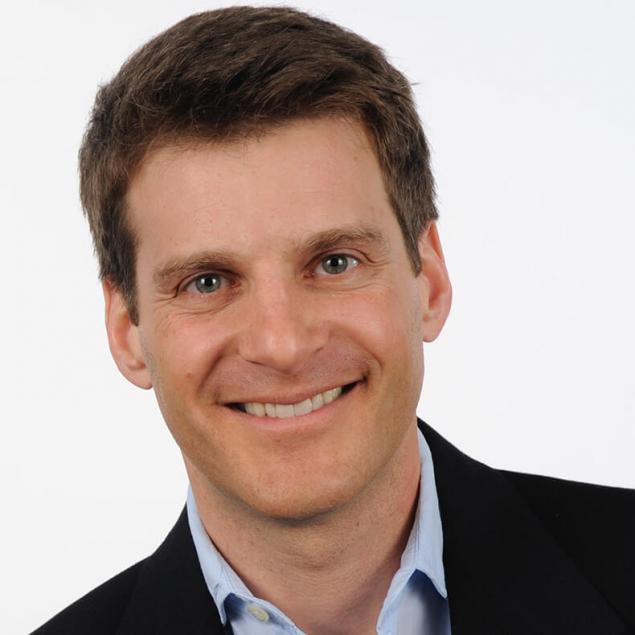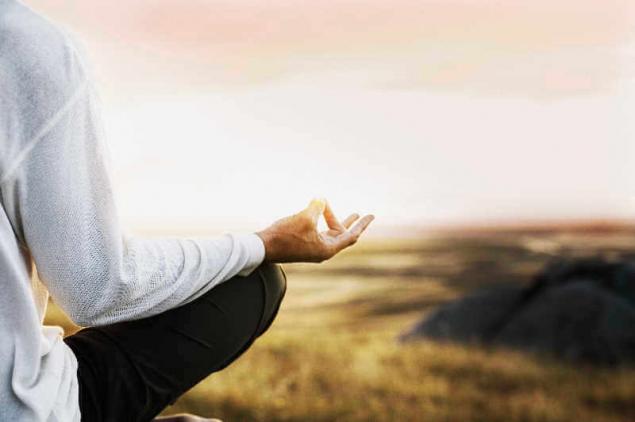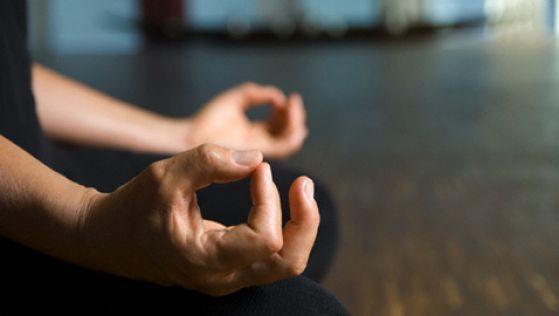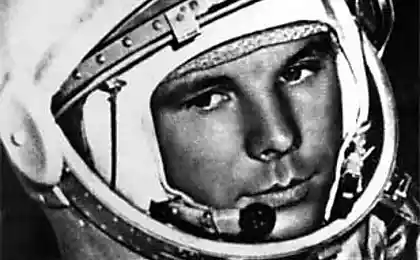788
Peter Bregman: Rule four seconds
In order to make effective decisions, instead of unproductive and be happy and calm, we need only 4 seconds. That's how much time is spent on what to exhale and let go of all doubts, problems and the chatter of the mind. About this in his book, "The rule of four seconds," says Peter Bregman, business coach and meditation practices.
Previous Bregman book "18 minutes" very quickly became a bestseller Wall Street Journal and was included in the top ten best business books of the year according to Publisher's Weekly and The New York Post. But in a new book, Peter offers strategies to replace destructive habits that consume our energy in vain, for new and effective.

With such unproductive habits can fight in 4 seconds - if you take a break, take a deep breath and think about their actions and their consequences - and then do something about it. That is important to make a break between stimulus and response - and be attentive to this
.
Rule four seconds
Four seconds
Pause. Breathe. Changing course
That morning, as usual in the morning, I sat down on a cushion on the floor, crossed his legs, put his hands on his knees, closed his eyes and breathed for twenty minutes - and nothing else
. They say that the most difficult thing in meditation - to find her time. And this makes sense. Who today has time to do nothing? Such employment is difficult to find an excuse.
Meditation has many advantages: it refreshes, helps to understand what happens to us, makes us wiser and calmer, it helps not to go crazy in the world who stuffs us with information and links, and more. If you lack economic justification to devote time of meditation, how about this: Meditation makes you more productive
. How? Strengthening your ability to resist distracting impulses.
Research shows that the ability to resist impulses improve relations, strengthen loyalty and increase productivity. If you are able to resist impulses, so you can make better, informed decisions, be more awareness that you say and how, and are able to imagine the consequences of their actions before they embark.
The ability not to succumb to the impulse determines how it will be easy to learn to behave differently or change an old habit. This is probably the single most important skill for growth and development.
As it turns out, it is one of the abilities that you can find through meditation. But it is not easy to learn.
When that morning I took a meditation posture, my worries disappeared. My mind was free of all that took him to the beginning of meditation. I did not notice anything but their own breathing. came easy, I felt peace in the body.
About four seconds.
At the time that it takes to make inhaling and exhaling. Next breath enough to thoughts flooded the head again. I felt an itch on his face and wanted to scratch. In the imagination there was a fine title for the next book, and I was drawn to write it until I did not forget. I remember at least four phone calls that need to be done, and one difficult conversation, to be held later.
I was worried, because I realized that I had only a few hours, I can dedicate the book. So why should I here, Russell? I wanted to open my eyes and look at the timer to see how long I have left to sit. I heard in the next room arguing children, and wanted to intervene.

But what is important: I wanted to do all of the above, but did not. Whenever I come to one of these thoughts, I once again moves the focus on the breath. Four seconds is enough to lose concentration, but enough of them, and to concentrate again. Four seconds - inhale and exhale - everything you need to keep from unproductive automatic reaction. Four seconds - all you need to make more informed strategic choice, which is more likely to bring you closer to the desired
. Sometimes the problem is not to do what you need to do. For example, when you avoid an unpleasant conversation. But sometimes the problem is that you do what do not: say, instead of listening to, driving a political game, instead of remaining above this
. Meditation teaches us to resist the urge to act in unproductive.
Later, I will talk about the fact that it is easier and safer to create an environment that will contribute to the achievement of your goals than to rely on willpower. However, at times rely on good old self.
For example, it is useful when an employee makes a mistake and you are ready to scream at him, though, and you know that much better - for him and for maintaining the morale of the whole team - ask a few leading questions and talk like reasonable people polite
Or when you want bryaknut something at a business meeting, but understand that it is better to listen to others. Or when you want to buy or sell shares, guided by emotions, despite the fact that the analytical performance and your own research suggests irrationality of such a solution. Or when you pull your emails every three minutes, rather than to concentrate on the task at hand.
Whenever during meditation you will be sure to rush - just one of the possible options. You have everything under control.
Does this mean that from now on you will never act on impulse? Of course not. Pulses are useful information. If you feel hungry, it may be a sure sign that you have time to eat, but can speak and that you're bored or you're stuck on a difficult stage. Meditation teaches us to control impulses to consciously choose what is to succumb to, and what is not.
How to meditate? If you are just starting out - the simpler, the better
. Sit - on a chair or on the floor on a pillow - and straighten your back so that you easily breathe, set the timer for the time you want to devote to meditation. Start the timer, close your eyes, relax, and do not move - just breathe - as long as the signal is heard. Focus on breathing in and out. Every time an idea or some impulse, give them a little attention and focus on breathing again.

That's all. Simple, but difficult to implement. Try it - today - for five minutes. And again tomorrow.
You do not have five minutes? Then let them be four seconds.
I do not miss
Stop checking email
Recently, I allowed myself a week's vacation with the family - without the high-tech: no computer, no phone, no e-mail
. Returning from a trip, I turned on the computer and found in the mailbox several hundred letters. I took a deep breath and began to respond. Three hours later my box - store messages that are stuck in the week - was empty
. Now let us compare it with what happened the next day and all the next, when I spent the post for more than three hours a day. Let some of that time was spent on a long exchange of letters, but the difference is still obvious.
I came to the conclusion that e-mail - a way to escape. Whenever I feel the slightest discomfort, I check the box. Stalled work on the article? Boring phone call? The ride in the elevator, a tedious meeting, concerns about the forthcoming meeting? You can check your emails. It is an easily accessible way to escape from unpleasant emotions.
The appeal of e-mail is that it is intriguing. I'm curious what is waiting for me in the mailbox. It's so tempting. And this occupation seems quite legitimate and even looks like a manifestation of the responsibility. I am working. I have to be sure you do not miss important email and respond promptly.
But this approach is becoming a serious problem. If we do not control their habits related to e-mail, e-mail begins to control us. All of my friends complain about the abundance of letters. They fall into the non-stop box. And we're like obsessed, constantly check the mail, distracted by the business meeting, during a conversation, doing their own thing.
The problem is not only letters in abundance but also that we treat them ineffective. Every time we go to check the mail, we lose time trying to get the phone to download new messages, read them, without answering, and then re-read those that have not responded to the last time. Later, once the computer, we reread it again.
Ineffective approach to working with e-mail affects us annoyingly. According to the American newspaper USA Today, the number of lawsuits filed by employees who claim the unauthorized overtime, increased in 2008 by 32 percent. The main reason? E-mail on a device like a smartphone infringes the inviolability of personal time.
The solution, I believe, suggests an experiment that I conducted after his week-long vacation. Instead of constantly check for new messages from a variety of devices, define the e-mail specific times during the day - at a time when you are at your computer. All of the remaining time available on the e-mails.
It is much more efficient to respond directly to the mass communications, while at the computer. We act quickly, the files you have on hand, it is easier to turn to support programs such as an electronic calendar. In addition, sitting for the sole purpose to process the mail, we meet with the problem face to face. Focus and commitment increase, we do not waste time switching from one case to another.
I treat my mail three times a day for thirty minutes: once in the morning, once in the afternoon and once before you turn off your computer. I start a timer and when it will ring, close the e-mail. Outside the scheduled periods of work with e-mail, I do not check new messages either from one device - up until the time comes another e-mail-session. And I no longer use the phone to get letters - except when the whole day away from the computer
. E-mail - a visual embodiment of the principle that I call "action - inaction." When you process incoming messages, dive into this hobby completely set aside all other business. The rest of the stay from the electronic box as far as possible. If I feel the impulse to check mail - and it happens often - I take a deep breath and concentrate on the emotions that feel. Then focus on the current lesson, even if it is just waiting for something else. I let your mind relax.
And that's what I found out: I do not miss
. Quite the contrary. I can feel the effect of presence throughout the day. I focused on what was happening around me at any time - no matter what without being distracted. I listen closely, I notice barely perceptible reaction of others that would otherwise be missed, and as long as my mind is free to wander, I get more and more new ideas. I became more productive, responsive, creative and happy.
In addition, I understand with their incoming messages faster, but more focused than before. I do not admit blunders typical of haste: do not put a copy in the wrong address, do not send the letter before they have time to finish, I do not admit in their reports some unpleasant for the recipient phrases. In short, I have become more and more efficient.
But what if someone requires urgent response? Such concerns - a clear example of false attempts of innovation, which only increases our dependence
. My new way of handling email is still no one enraged. I suspect that no one even noticed my mini-vacations because they respond to an email within a few hours is perfectly normal.
And in the rare instances when people need an answer within the next few minutes, they'll find me in other ways. Writing SMS or calling
E-mail is no longer a burden for me. I spend on it a half hour a day, and this time I just have enough. You may need more or less time - to experiment, and then fill in your schedule suitable for this period of time
. The hardest thing - to resist the urge to check your mail for this unscheduled hours. My advice: if you pull to check the mail, check the better you feel
. What's going on in your mind? What emotions did you experience? Take a deep breath and relax, enjoying the moment, when you have no distractions. In the midst of the hectic business day at some moment you suddenly feel like on vacation.
chapter from the book by Peter Bregman "Rule four seconds».
Author: Alena Sermon
Previous Bregman book "18 minutes" very quickly became a bestseller Wall Street Journal and was included in the top ten best business books of the year according to Publisher's Weekly and The New York Post. But in a new book, Peter offers strategies to replace destructive habits that consume our energy in vain, for new and effective.

With such unproductive habits can fight in 4 seconds - if you take a break, take a deep breath and think about their actions and their consequences - and then do something about it. That is important to make a break between stimulus and response - and be attentive to this
.

Rule four seconds
Four seconds
Pause. Breathe. Changing course
That morning, as usual in the morning, I sat down on a cushion on the floor, crossed his legs, put his hands on his knees, closed his eyes and breathed for twenty minutes - and nothing else
. They say that the most difficult thing in meditation - to find her time. And this makes sense. Who today has time to do nothing? Such employment is difficult to find an excuse.
Meditation has many advantages: it refreshes, helps to understand what happens to us, makes us wiser and calmer, it helps not to go crazy in the world who stuffs us with information and links, and more. If you lack economic justification to devote time of meditation, how about this: Meditation makes you more productive
. How? Strengthening your ability to resist distracting impulses.
Research shows that the ability to resist impulses improve relations, strengthen loyalty and increase productivity. If you are able to resist impulses, so you can make better, informed decisions, be more awareness that you say and how, and are able to imagine the consequences of their actions before they embark.
The ability not to succumb to the impulse determines how it will be easy to learn to behave differently or change an old habit. This is probably the single most important skill for growth and development.
As it turns out, it is one of the abilities that you can find through meditation. But it is not easy to learn.
When that morning I took a meditation posture, my worries disappeared. My mind was free of all that took him to the beginning of meditation. I did not notice anything but their own breathing. came easy, I felt peace in the body.
About four seconds.
At the time that it takes to make inhaling and exhaling. Next breath enough to thoughts flooded the head again. I felt an itch on his face and wanted to scratch. In the imagination there was a fine title for the next book, and I was drawn to write it until I did not forget. I remember at least four phone calls that need to be done, and one difficult conversation, to be held later.
I was worried, because I realized that I had only a few hours, I can dedicate the book. So why should I here, Russell? I wanted to open my eyes and look at the timer to see how long I have left to sit. I heard in the next room arguing children, and wanted to intervene.

But what is important: I wanted to do all of the above, but did not. Whenever I come to one of these thoughts, I once again moves the focus on the breath. Four seconds is enough to lose concentration, but enough of them, and to concentrate again. Four seconds - inhale and exhale - everything you need to keep from unproductive automatic reaction. Four seconds - all you need to make more informed strategic choice, which is more likely to bring you closer to the desired
. Sometimes the problem is not to do what you need to do. For example, when you avoid an unpleasant conversation. But sometimes the problem is that you do what do not: say, instead of listening to, driving a political game, instead of remaining above this
. Meditation teaches us to resist the urge to act in unproductive.
Later, I will talk about the fact that it is easier and safer to create an environment that will contribute to the achievement of your goals than to rely on willpower. However, at times rely on good old self.
For example, it is useful when an employee makes a mistake and you are ready to scream at him, though, and you know that much better - for him and for maintaining the morale of the whole team - ask a few leading questions and talk like reasonable people polite
Or when you want bryaknut something at a business meeting, but understand that it is better to listen to others. Or when you want to buy or sell shares, guided by emotions, despite the fact that the analytical performance and your own research suggests irrationality of such a solution. Or when you pull your emails every three minutes, rather than to concentrate on the task at hand.
Whenever during meditation you will be sure to rush - just one of the possible options. You have everything under control.
Does this mean that from now on you will never act on impulse? Of course not. Pulses are useful information. If you feel hungry, it may be a sure sign that you have time to eat, but can speak and that you're bored or you're stuck on a difficult stage. Meditation teaches us to control impulses to consciously choose what is to succumb to, and what is not.
How to meditate? If you are just starting out - the simpler, the better
. Sit - on a chair or on the floor on a pillow - and straighten your back so that you easily breathe, set the timer for the time you want to devote to meditation. Start the timer, close your eyes, relax, and do not move - just breathe - as long as the signal is heard. Focus on breathing in and out. Every time an idea or some impulse, give them a little attention and focus on breathing again.

That's all. Simple, but difficult to implement. Try it - today - for five minutes. And again tomorrow.
You do not have five minutes? Then let them be four seconds.
I do not miss
Stop checking email
Recently, I allowed myself a week's vacation with the family - without the high-tech: no computer, no phone, no e-mail
. Returning from a trip, I turned on the computer and found in the mailbox several hundred letters. I took a deep breath and began to respond. Three hours later my box - store messages that are stuck in the week - was empty
. Now let us compare it with what happened the next day and all the next, when I spent the post for more than three hours a day. Let some of that time was spent on a long exchange of letters, but the difference is still obvious.
I came to the conclusion that e-mail - a way to escape. Whenever I feel the slightest discomfort, I check the box. Stalled work on the article? Boring phone call? The ride in the elevator, a tedious meeting, concerns about the forthcoming meeting? You can check your emails. It is an easily accessible way to escape from unpleasant emotions.
The appeal of e-mail is that it is intriguing. I'm curious what is waiting for me in the mailbox. It's so tempting. And this occupation seems quite legitimate and even looks like a manifestation of the responsibility. I am working. I have to be sure you do not miss important email and respond promptly.
But this approach is becoming a serious problem. If we do not control their habits related to e-mail, e-mail begins to control us. All of my friends complain about the abundance of letters. They fall into the non-stop box. And we're like obsessed, constantly check the mail, distracted by the business meeting, during a conversation, doing their own thing.
The problem is not only letters in abundance but also that we treat them ineffective. Every time we go to check the mail, we lose time trying to get the phone to download new messages, read them, without answering, and then re-read those that have not responded to the last time. Later, once the computer, we reread it again.
Ineffective approach to working with e-mail affects us annoyingly. According to the American newspaper USA Today, the number of lawsuits filed by employees who claim the unauthorized overtime, increased in 2008 by 32 percent. The main reason? E-mail on a device like a smartphone infringes the inviolability of personal time.
The solution, I believe, suggests an experiment that I conducted after his week-long vacation. Instead of constantly check for new messages from a variety of devices, define the e-mail specific times during the day - at a time when you are at your computer. All of the remaining time available on the e-mails.
It is much more efficient to respond directly to the mass communications, while at the computer. We act quickly, the files you have on hand, it is easier to turn to support programs such as an electronic calendar. In addition, sitting for the sole purpose to process the mail, we meet with the problem face to face. Focus and commitment increase, we do not waste time switching from one case to another.
I treat my mail three times a day for thirty minutes: once in the morning, once in the afternoon and once before you turn off your computer. I start a timer and when it will ring, close the e-mail. Outside the scheduled periods of work with e-mail, I do not check new messages either from one device - up until the time comes another e-mail-session. And I no longer use the phone to get letters - except when the whole day away from the computer
. E-mail - a visual embodiment of the principle that I call "action - inaction." When you process incoming messages, dive into this hobby completely set aside all other business. The rest of the stay from the electronic box as far as possible. If I feel the impulse to check mail - and it happens often - I take a deep breath and concentrate on the emotions that feel. Then focus on the current lesson, even if it is just waiting for something else. I let your mind relax.
And that's what I found out: I do not miss
. Quite the contrary. I can feel the effect of presence throughout the day. I focused on what was happening around me at any time - no matter what without being distracted. I listen closely, I notice barely perceptible reaction of others that would otherwise be missed, and as long as my mind is free to wander, I get more and more new ideas. I became more productive, responsive, creative and happy.
In addition, I understand with their incoming messages faster, but more focused than before. I do not admit blunders typical of haste: do not put a copy in the wrong address, do not send the letter before they have time to finish, I do not admit in their reports some unpleasant for the recipient phrases. In short, I have become more and more efficient.
But what if someone requires urgent response? Such concerns - a clear example of false attempts of innovation, which only increases our dependence
. My new way of handling email is still no one enraged. I suspect that no one even noticed my mini-vacations because they respond to an email within a few hours is perfectly normal.
And in the rare instances when people need an answer within the next few minutes, they'll find me in other ways. Writing SMS or calling
E-mail is no longer a burden for me. I spend on it a half hour a day, and this time I just have enough. You may need more or less time - to experiment, and then fill in your schedule suitable for this period of time
. The hardest thing - to resist the urge to check your mail for this unscheduled hours. My advice: if you pull to check the mail, check the better you feel
. What's going on in your mind? What emotions did you experience? Take a deep breath and relax, enjoying the moment, when you have no distractions. In the midst of the hectic business day at some moment you suddenly feel like on vacation.
chapter from the book by Peter Bregman "Rule four seconds».
Author: Alena Sermon
This means rejuvenates the skin - the effect is stunning!
Tesla Model 3 and Chevy Bolt. Competitors, worthy of respect























